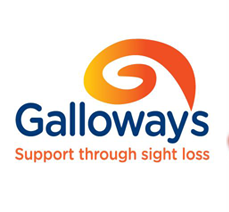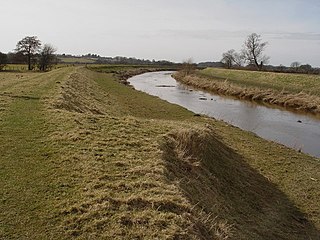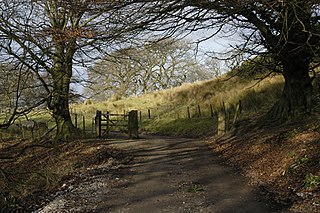
Lancashire is a ceremonial county in North West England. It is bordered by Cumbria to the north, North Yorkshire and West Yorkshire to the east, Greater Manchester and Merseyside to the south, and the Irish Sea to the west.

Lancaster is a city in Lancashire, England, and the main cultural hub, economic and commercial centre of City of Lancaster district. The city is on the River Lune directly inland from Morecambe Bay. Lancaster is the county town although Lancashire County Council has been based at County Hall in Preston since its formation in 1889.

The A6 is one of the main north–south roads in England. It runs from Luton in Bedfordshire to Carlisle in Cumbria, although it formerly started at a junction with the A1 at Barnet in north London, and is described as running from London to Carlisle. It is the fourth longest numbered road in Britain; only the A1, A38 and A30 are longer.

Wyre is a local government district with borough status on the coast of Lancashire, England. The council is based in Poulton-le-Fylde and the borough also contains the towns of Cleveleys, Fleetwood, Garstang, Preesall and Thornton, along with numerous villages and surrounding rural areas. Some of the borough's built-up areas form part of the wider Blackpool urban area. Eastern parts of the borough lie within the Forest of Bowland, a designated Area of Outstanding Natural Beauty.

Lancashire is a county of England, in the northwest of the country. The county did not exist in 1086, for the Domesday Book, and was apparently first created in 1182, making it one of the youngest of the traditional counties.

Galloway's Society for the Blind, also known as Galloways, is a charity based in Lancashire, England, which supports people with sight loss. It is one of Lancashire's oldest charities, established in 1867 following a public meeting in the Corn Exchange, Preston. It was originally the Preston Industrial Institute for the Blind, then the Institute for Blind Welfare and until 2000 the Preston and North Lancashire Blind Welfare Society. It is now named after William Wilding Galloway, a cotton merchant from Preston who left £40,000 to local charities including £10,000 to the society when he died in 1936. The Society renamed itself in July 2000, to avoid its cumbersome previous name which was commonly abbreviated to the ambiguous "The Blind Society" and to honour its greatest benefactor.

Lancaster was a constituency of the House of Commons of the Parliament of England then of the Parliament of Great Britain from 1707 to 1800 and of the Parliament of the United Kingdom from 1801 to 1867, centred on the historic city of Lancaster in north-west England. It was represented by two Members of Parliament until the constituency was disenfranchised for corruption in 1867.

The diocese of Blackburn is diocese of the Church of England in North West England. Its boundaries correspond to northern Lancashire with the exception of the eastern part of the Forest of Bowland, which is part of the diocese of Leeds. The diocese contains 211 parishes and 280 churches. Blackburn Cathedral is the seat of the bishop of Blackburn, currently Philip North, and the diocesan offices are also located in Blackburn.

Pendleton is an inner-city suburb and district of Salford, Greater Manchester, England. The A6 dual carriageway skirts the east of the district. Historically in Lancashire, Pendleton experienced rapid urbanisation during the Industrial Revolution.

Lancashire was a county constituency of the House of Commons of the Parliament of England from 1290, then of the Parliament of Great Britain from 1707 to 1800, and of the Parliament of the United Kingdom from 1801 to 1832. It was represented by two Members of Parliament, traditionally known as Knights of the Shire until 1832.

Great Eccleston is a village and civil parish in Lancashire, England, situated on a coastal plain called the Fylde. The village lies to the south of the River Wyre and the A586 road, approximately 10 miles (16 km) upstream from Fleetwood. At the 2001 census, the parish had a population of 1,473, rising slightly to 1,486 at the 2011 census.

Garstang is an ancient market town and civil parish within the Wyre borough of Lancashire, England. It is 10 miles (16 km) north of the city of Preston and the same distance south of Lancaster.

The Morecambe Bay Independents (MBIs) is a local political party in Morecambe, Lancashire. The group ran Lancaster City Council from 1999 to 2003, and successfully campaigned in 2005 for the creation of Morecambe Town Council.
Harry Goodwin was a British photographer, known for his images of pop musicians and sports personalities. He was the resident photographer of the BBC Television programme Top of the Pops from its inception in 1964 until 1973.

Nether Wyresdale is a civil parish in Lancashire, England. In the 2001 United Kingdom census, it had a population of 613, rising to 655 at the 2011 census.

The Borough of Warrington is a unitary authority area with borough status in the ceremonial county of Cheshire, England. The borough is centred around the town of Warrington, and extends out into outlying villages of Lymm and Great Sankey and the town of Birchwood.

Lt-Col Henry Fishwick was a British soldier, politician and antiquary. After a military career, he became a Liberal Party Councillor (1871–1914) and twice Mayor of Rochdale (1903–05). He was also author and editor of several books on Lancashire and was a founding member of three of the county's historical societies.

















